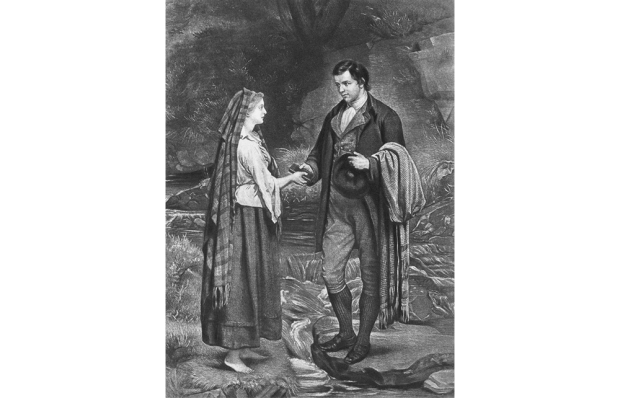In Competition No. 2965, an enormously popular one, you were invited to write a poem about a verse form, written in that form.
It was Edna St Vincent Millay’s sonnet-about-the-sonnet ‘I will put Chaos into fourteen lines’ that inspired this challenge but there are other similar examples — Robert Burns’s fine ‘A Sonnet upon Sonnets’, for one: ‘Fourteen, a sonneteer thy praises sings;/ What magic myst’ries in that number lie!…’
There were plenty of poems about the sonnet in all its guises, but I was also drowning in limericks, clerihews, double dactyls, haikus, cinquains, pantoums, ottava rima, terza rima… Accomplished entries from D.A. Smith, Jane Blanchard, Frank McDonald, Hugh King, Noah Heyl, Max Gutmann, Susan McLean and Katie Mallett narrowly missed the cut. The first six printed below take £25 each; the final two earn their authors £15 apiece.
A rondel is made like a roundelay,
With a rhyme, call it A, and a rhyme, call it B,
Which repeats, it repeats, (do you see, do you see?)
Until back comes your A like he’s ready to play,Like he’s ready to play in a holiday way,
Until B with a buzz, with a buzz like a bee,
Yes it’s B like a bee coming back to the fray,
Like a bee or a flea, yes as fit as a flea,Is your B. And your A with his hey-hey-hey,
As brisk as your B with his two times three,
Tweedledum, tweedledee, with their two times three,
Like a cool cabaret or a mad matinee.A rondel is made like a roundelay.
John Whitworth
O where are you going — you ponderous tale
Whose ending unfolds with the speed of a snail?
And why must you parrot again and again
A repetitive, tedious, tiresome refrain?
O who gives a fig why Lord Randall so ails
Or doomed Barbara Allen her downfall bewails
Or, fighting at Flodden, King Jamie is slain?
Romantic or tragic, your form is a pain.The Sonnet’s delightful, the Rondeau as well,
And so is the cunningly rhymed Villanelle,
The Haiku’s compact and the Elegy’s deep,
But you, like a sedative, guarantee sleep.
From medieval roots, like a weed, you survived
And, nourished by troubadours, flourished and
thrived
Till, conquering Christendom, bland as green salad,
Established at last, you’re baptised as the Ballad.Alan Millard
Petrarchan sonnets first eight lines rhyme thus:
a b b a; again, a b b a.
Tough (for the poet) but the sestet’s way
is looser, and the scheme more generous.
Quite simple: c d e (repeat). Less fuss.
Eight lines of ‘problem’, then the ‘answer’ may
resolve itself within the sestet’s play.
This flexibility’s a major plus.Shakespearean sonnets? Quite another thing.
Three quatrains, piling up like building blocks
or winter clothes laid down inside a trunk.
From lesser hands the final couplets bring
conclusions obvious as matching socks.
They belt up with a terrifying clunk.D.A. Prince
A patter-song’s a vehicle for verbal virtuosity,
And, though some look askance at such a lyrical
monstrosity,
It emanates a quality of literate frivolity
By setting words a-dancing at a super-high velocity.
A patter-song must bubble with a wild linguistic
fizziness
And has to be outlandish-ish if it’s to do the bizz-
i-ness.
(That word, of course, was mauled about and others
will be hauled about
Until the hearer’s bludgeoned to a state of utter
dizziness.)
A patter-song gets gusto when it mixes with its
smattering
Of trisyllabic rhymables a sense of easy chattering.
It ransacks the thesauruses for words to fit its
choruses;
It’s hard to sing but fun to hear and that’s the joy
of pattering.George Simmers
A triolet is eight lines long.
It doesn’t really sing.
But shudders like a dinner gong.
A triolet is eight lines long
Ding dong ding dong ding bleeding dong
God curse the bloody thing.
A triolet is eight lines long.
It doesn’t really sing.
Phoebe FloodDubberly-dacterly
Dish the dimeters, with
Choriambs only in
Lines eight and four.Always make sure that the
Antepenultimate
Line has six syllables,
No less, no more.Sylvia Fairley
Haiku’s a sandwich.
Five seven five syllables.
All ham not much bread.Fiona Pitt-Kethley
Edmund C. Bentley
Should have been informed, gently,
That of his own verses in the genre, very few
Are good examples of the clerihew.Penelope Mackie
No. 2968: creation story
Ted Hughes wrote How the Whale Became. You are invited to substitute another animal or fish for ‘Whale’ and submit a short story with that title. Please email entries of up to 150 words to lucy@spectator.co.uk by midday on 28 September.
Got something to add? Join the discussion and comment below.
Get 10 issues for just $10
Subscribe to The Spectator Australia today for the next 10 magazine issues, plus full online access, for just $10.











Comments
Don't miss out
Join the conversation with other Spectator Australia readers. Subscribe to leave a comment.
SUBSCRIBEAlready a subscriber? Log in